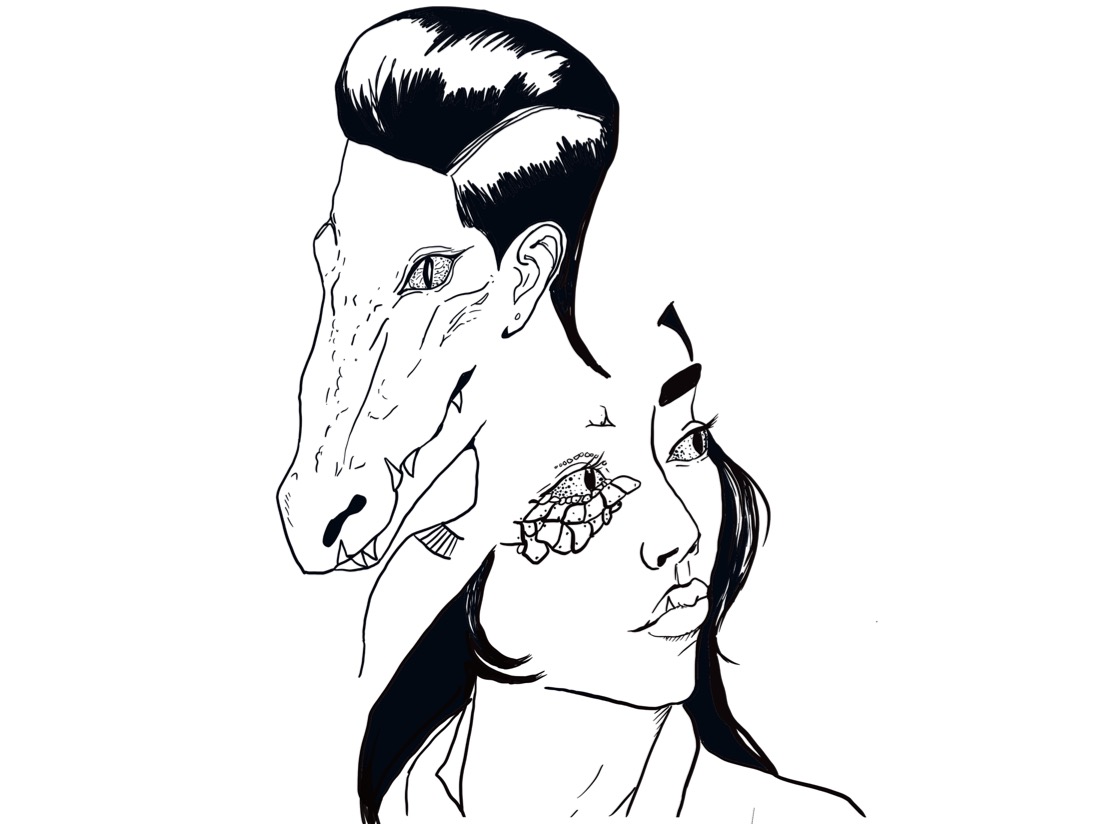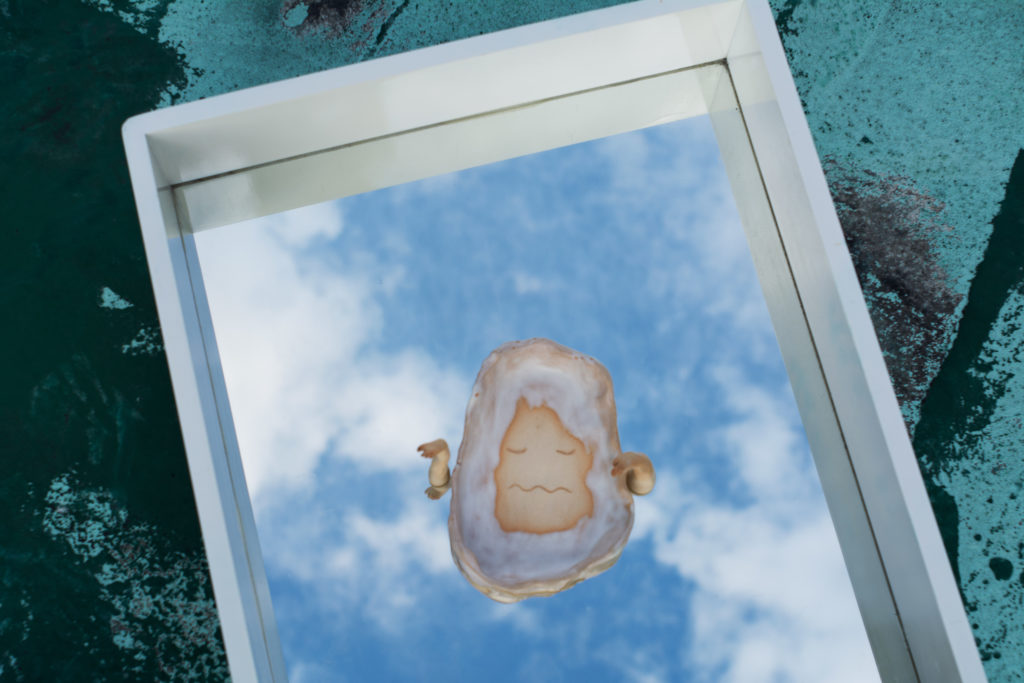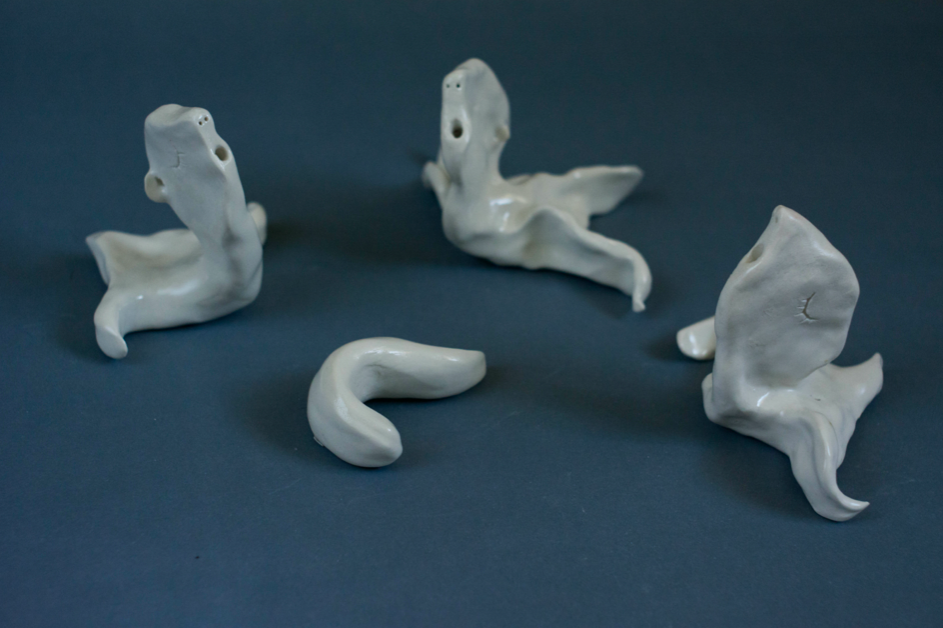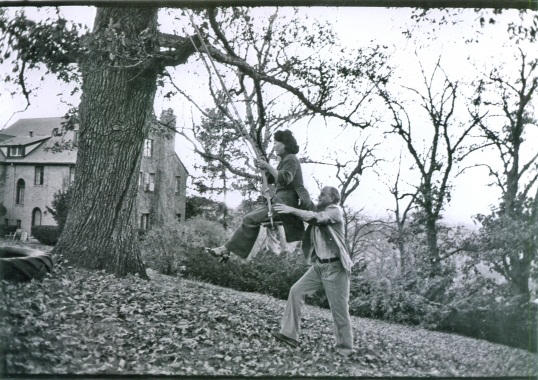It didn’t bother him that he attracted, and was attracted to, people of the same gender—all of this felt perfectly natural to him.

July 26, 2021
Editor’s Note: The following essay by the Elder LGBTQ Team of Taiwan Tongzhi (LGBTQ+) Hotline Association 台灣同志諮詢熱線協會 and translated by Jeremy Tiang is part of a notebook Queer Time, co-edited by Ta-wei Chi and Ariel Chu, which gathers contemporary queer Taiwanese literature in translation. To read the full Queer Time collection, visit its home here.
By the Elder LGBTQ Team of Taiwan Tongzhi (LGBTQ+) Hotline Association 台灣同志諮詢熱線協會
Transcript by Tang Yi-Peng 湯翊芃
From Grandma’s Girlfriends 阿媽的女朋友:彩虹熟女的多彩青春
Translated by Jeremy Tiang
TRANSLATOR’S NOTE
Grandma’s Girlfriends is a response of sorts to The Rainbow Bus: Youthful Reminiscences of Twelve Older Gay Men/彩虹熟年巴士:12位老年同志的青春記憶 (GBooks, 2010). Tong, the cameraperson at the launch of The Rainbow Bus, remembers feeling indignant that only queer men were included in this book, and set in motion the plan to record the lives of older queer women too. Over the next few years, a group of volunteers from the Elder LGBTQ Team of Taiwan Tongzhi (LGBTQ+) Hotline Association, Taiwan’s oldest and largest lesbian, gay, bisexual, and transgender organization (founded in 1998), interviewed seventeen subjects found via Facebook, chatboards, and flyers placed in lesbian bars. These stories were then collected in Grandma’s Girlfriends (Locus Publishing, 2020).
In a brief English-language preface to the book, the editors say, “The impression of elder homosexuals that remains engraved in today’s youth generation is that the former were born in the wrong time, and were unfortunately unable to appreciate the liberation brought by LGBT activism. …The elder lesbians’ stories told in this book completely overturn those stereotypes: their lives back then were even more reckless, even more exciting!”
Queer language in Taiwan does not map completely onto Western norms. As a butch lesbian, Huang Hsiao-Ning identifies as a woman and uses he/him pronouns. The Taiwanese term for “butch” is the English letter “T,” which stands for “tomboy.”
Towards the end of the “Period of U.S. Aid in Taiwan,” a dashing youth of just five foot five took the stage at the Ching Chuan Kang Air Base American Servicemen’s Club, strumming his guitar and performing one of that era’s popular U.S.-style folk ballads. No one could have known the depths of sorrow in the singer’s heart, nor that his drinking and exuberant performances were an attempt to quench his deep sadness and shake off the emotions that clung to him. As this melancholic figure took a sip of beer to clear his throat, a G.I. noticed his appearance, pointed at him, and exclaimed, “Martha! You’re a tomboy!” In that instant, although the singer didn’t know what this meant—no one did—these words flipped a switch in his life, marking a turning point in the influence of the West on the Taiwanese lesbian community. This singer was Huang Hsiao-Ning, the first female singer in Taiwanese history to perform with a masculine presentation. He was a T, short for tomboy, just as the soldier had said.
Huang Hsiao-Ning was very prominent in the 1960s and 70s, then vanished from our screens for many years. More recently, he hauled his body—still not old—back into the public eye, appearing on the biggest Taiwanese television programs, resplendent as ever. He also showed up in Mainland Chinese talent shows, competing alongside amateur singers. More seasoned performers regard him as their forebear, and the singer David Tao praised him on air as a pioneer of Chinese blues and rock’n’roll. Starting in 1969, he appeared on Mainland Chinese and Taiwanese TV, and was soon a fixture on Melody of Youth, singing Western hits. Soon after that, he became the host of Yesterday, Today, Tomorrow, cementing his place as the face of Western music in Taiwan. This style of music waned in popularity after the USA ended diplomatic relations with Taiwan in 1978, and young people here clamored to “create our own songs with our own language.” Huang Hsiao-Ning was also active in the so-called campus folk song movement that arose as a result.
*
Huang Hsiao-Ning was born in 1944 in Anhua County, Hunan Province. Four years later (the 37th Year of the Republic), he moved to Taiwan with his parents, and they settled in Yonghe. From a young age, he preferred playing with boys, and enjoyed male-coded toys such as punching bags and marbles. His mother found him too mischievous and sent him for early enrollment at the elementary school affiliated with the Women’s Teaching College, where he gained an appreciation for the elegant, more developed, and more mature girls. Now he thought stinky boys were only useful as sparring partners. He was never good at book-learning, and instead of going to high school, he chose to be one of the very first students at the newly-opened Kai Ping Culinary School. There, he fell in with a rowdy crowd who got into trouble one day—messing around in the countryside, they accidentally brought down a very old tree. The property owner made such a fuss that their principal was forced to expel many members of this group. Though Hsiao-Ning escaped punishment, his mother urged him to retake the high school entrance exams, and he got into Blessed Imelda’s Girls’ High, a Dominican school, where he stayed for the next six years.
Hsiao-Ning was very fond of sports and played basketball, softball, and ping-pong. He’d always been the smallest person in his class, but between the first and second years of junior high, he shot up from four foot four to five foot five. Around this time, his family acquired a record player, which gave him access to even more wonderful tunes than his old stereo had been able to produce. He began listening to music in earnest, as well as taking up the guitar, setting up a choir, conducting an orchestra, and singing his heart out while lounging under a tree in his schoolyard. His debonair demeanor enraptured the student body, and an endless stream of admiration and love letters came his way. It didn’t bother him that he attracted, and was attracted to, people of the same gender—all of this felt perfectly natural to him.
He didn’t do particularly well on his finals and ended up studying Business at Ming Chuan University. He was lucky not to have failed altogether, having performed at Zhongshan Hall the night before his exams. This show was full of youthful energy, like the concert scene in A Brighter Summer Day, which had been shot in the same location and featured the same type of music, including Elvis Presley songs. The only difference was the person holding the mic on stage: Huang Hsiao-Ning himself.
*
Everyone plays many roles over the course of a lifetime, and those who live on stage play even more. The volunteers from the Hotline were starstruck as they set off to interview this uncle, as older Ts are respectfully known. Apart from having done their research online, they made sure they had plenty of questions ready when they showed up at the American-style diner in an alleyway off Nanjing East Road. The volunteers nodded eagerly as they discussed music, creating a reverent “fan club” atmosphere. Seeing how stiffly they were sitting, Hsiao-Ning dropped his grand persona, lit a cigarette, passed around some snacks, and threw his arms around their shoulders until he successfully moved the conversation on to a much more interesting topic: stories and gossip from the world of show business.
By the age of seventy-two, Hsiao-Ning had obviously had countless liaisons—accidentally hooking up with a gangster’s girlfriend, dating a female artiste who was a household name, and so forth—but only a few encounters had left a deep impression on him.
One of these encounters involved a student he tutored while working as a teaching assistant at Ming Chuan, a young lady from a rich family who was always dressed head to toe in the latest fashions from the import store at Qingguang Market. This was first love, Hsiao-Ning’s first long-term relationship, and his first experience of physical intimacy. In that more innocent era, even the most debauched lotharios believed in “taking responsibility for sex,” something Hsiao-Ning took very seriously. He bought his girlfriend many gifts, worked hard, and made sure his work obligations never took him too far away from Taipei, so he could be on hand to provide love and guidance. They had been together three years when the girlfriend up and married a man, a heavy blow to Hsiao-Ning. His career was thriving at that time, and his friends persuaded him to venture out more, so he went from never drinking to carousing every night. Thus began his foray into the showbiz life.
We can’t talk about these adventures without mentioning his twelve sworn brothers, all of them Ts. Being the second eldest, Hsiao-Ning was known as Second Brother. When describing the brothers’ legendary exploits, Hsiao-Ning was so rapt that he didn’t even stop to light the cigarette he was holding. These brothers hung out in the nightclubs on Dehui Street, the Western restaurants on Zhongshan North Road, and the piano bars where Hsiao-Ning sang. They also loved gay bars and eventually added a gay man to their gang—he was called Thirteenth Sister. They ate out, got into fights, boogied in dance halls, ordered made-to-measure suits, acquired girlfriends, kept mistresses, and drank and made merry all through the night. They took their work very seriously and played just as hard. Time rolled on, and soon most of them were middle-aged. Women at this time were under a lot of pressure to marry men and start families, but these twelve brothers resisted, lazi till the end. (The term “lazi,” meaning “lesbian,” was coined by Qiu Miaojin in Notes of a Crocodile more than twenty years after this sworn brotherhood was formed; its appearance here shows that Hsiao-Ning was familiar with younger people’s queer slang too.) They’d once talked about living together and taking care of each other when they were elderly, but by the time old age actually arrived, they’d gone their separate ways, and many were struggling financially, leading frugal lives. Some still had to toil, some had passed away, and some lived in lonely isolation.
*
In 1982, at the age of 38, Hsiao-Ning emigrated to the USA. His family had already gone ahead—he was the last one to leave Taiwan. This meant putting his decade-old Taiwanese performing career on hold. He felt some despair upon leaving, or perhaps it was despair that led to his departure.
Although his queer identity had never been much of an issue, he’d been in talks with the Chinese Television System, a Taiwanese TV station, to present a program on popular music at the time, and the producers were insisting that he take on a more feminine appearance—they looked down on his butchness. This was deeply offensive to him. Although these hostile moments were few and far between, the fact that a television station could express such views definitely hastened his plans to leave the country and withdraw from the television world. Resisting these homophobic producers wasn’t a question of ego—he was quite easygoing and had once performed in a dress at the request of his fans. Rather, his identity as a T was now being used to humiliate him, which was more than he could stand.
He opened a bar in Los Angeles, got married, and hung out in gay establishments. Yet, recounting these events, he seemed less animated than when talking about his life in Taiwan.
Always a gregarious person, he kept the bar for twelve years. Many Taiwanese celebrities stopped by whenever they were in town to see him and to sing a tune or two. He made many new friends in the States and started dating a girl from Beijing, whom he married in order to secure her a spousal visa. This same-sex union eventually dissolved, but Hsiao-Ning magnanimously gifted his former wife half the proceeds from the bar.
Back then, the USA seemed like an advanced nation, and every Taiwanese person wanted to go there. Being a devotee of Western music, Hsiao-Ning did too. He lived there for thirty-two years and didn’t return to Taiwan at all for a long stretch of time. Then in 2014, he came back for surgery to remove a thirteen-centimeter-long tumor from his kidney. After this, he no longer had the energy to run a bar and resolved to stay in Taiwan, where he could get back into the music business and revive an old dream. Here, he had better healthcare and more old friends to look after him. He could feel like he belonged.
Many people wish for a life like his, partying all the way from youth into old age, but this existence was hard-won, endless work with no rest. During his three decades in the States, he took on all kinds of jobs, and had to keep performing even in his seventies. Although his background was solidly middle class, his family wasn’t rich by any means, and he had to keep supporting them. He frequently mentioned that his mother had spent half a month’s salary to buy him his first guitar. Back when he first started performing, not only was he obliged to buy his girlfriend gifts, but he also felt—as the eldest child—that he was responsible for his mother’s hefty medical expenses. Fortunately, he earned far more as a singer than he had as a teaching assistant, and was able to take on some of the family’s financial burden. It was clear from the way he spoke how important family was to him. He was always grateful for the care his parents had shown him, and proud of his siblings.
Both his parents lived well into their nineties, which made Hsiao-Ning believe that he, too, might not die for many more years. After a lifetime of playing around, he was ready to pause and look back: to compose songs, write about his past, and keep singing. Life begins at seventy.
When Hsiao-Ning looked back at his past, he recounted moments of struggle and feeling lost. In his twenties, he’d considered getting married and had tried going on movie dates with men, but this plan just hadn’t worked. It had felt wrong having male hands slithering towards him, and when men pursued him, his immediate response was to flee. He gradually began to understand that his innermost self was masculine, and that the life partner he wanted was a woman. He was at ease with his appearance and felt able to accept and express his sexual orientation. He had never been in the closet, but fully owned who he was: a tomboy.
Unfortunately, society was not so tolerant. He knew that his being a woman meant he couldn’t promise his partner a future, and that if someone he was dating was of marriageable age, he would have to let them get married. This was the tide that many queer women of that era were swimming against, and the same holds true today. As a result, although Hsiao-Ning never lacked companionship, he was always lonely deep inside. He believed it was his destiny to always be alone.
Hsiao-Ning described how his first love, a girl in high school, had handed him an affectionate letter and blurted out “Huang Hsiao-Ning, I love you!” So awkward, so innocent. Love without thought of benefit or loss. This gesture continued to move him. Before meeting Hsiao-Ning, we had assumed it would be the memorable events of his glamorous showbiz life that left the deepest impression on him, but it turned out that human beings are much simpler at heart.
Even at the age of seventy-three, Hsiao-Ning still had an unquenchable thirst for all kinds of knowledge. Having experienced so many dramatic changes in his life, he remained willing to continually renew himself, and was always ready to explore new possibilities.
In 2014, he once again performed at Taipei’s Zhongshan Hall, and in 2015, he gave a concert at Sun Yat-sen Memorial Hall, dashing with his suit, acoustic guitar, Stetson, and classic sunglasses, gyrating on stage with undiminished vigor.
EPILOGUE
By Gofyy
When our large group of volunteers interviewed Hsiao-Ning in 2015, none of us had detected any signs of ill health. It was only much later that we learned he’d already been unwell then. At the time, he’d been chugging beer and smoking one cigarette after another, laughing and chatting about his thrilling life, making everyone feel welcome as he generously shared his anecdotes of past events and romances. That was Huang Hsiao-Ning through and through, staying young into old age, exactly the same in public and private, never concealing that he was a T who loved women.
His memorial service took place in the fall of 2018 at Taipei’s Second Funeral Parlor. An enormous photograph hung in the hall, showing Hsiao-Ning resplendent in jeans and dark glasses, holding a guitar, the female Elvis welcoming old friends before a rousing concert, eyes shut and radiating charisma, ready to launch into a song at any moment. For once, though, Hsiao-Ning wasn’t taking center stage. Many veteran performers showed up to see him off, making it clear how popular he had been. Despite his long absence from Taiwanese entertainment circles, his star power gleamed as brightly as ever. A glittering constellation of stars attended, including Chang Hsiao-yen, a fellow television performer and household name from the 70s; Billie Wang, who’d performed alongside Hsiao-Ning back in the American Servicemen’s Club, and who embodied the spirit of revolution; and Yu Kuang, the godfather of Western music in Taiwan, who had already been performing on TV five decades ago, and who had first invited Hsiao-Ning to appear on Melody of Youth.
The memories flowed amid laughter and tears for this once-in-a-generation celebrity, yet there was something strange about the atmosphere. Half a century ago, Huang Hsiao-Ning had already been out and proud, refusing to bow to society’s traditional views on the gender binary. So why did it feel like his sexual identity was deliberately going unmentioned? If not for Hsiao-Ning’s little sister reminiscing about how Hsiao-Ning had seemed more like her big brother, or a friend joking that Hsiao-Ning had pursued every single one of their female acquaintances, I could have imagined that I was attending the memorial of a heterosexual cis woman. It felt like being at a hot and heavy rock’n’roll concert, only to turn and see that everyone around you was dancing ballet.
Right up to the end of his life, Hsiao-Ning was just as debonair as he had been for the last seventy-four years, never doubting himself as a musician and a handsome T. This frank self-confidence was a major part of who he was. Why couldn’t the people seeing him off have been equally open about his being a T as they said goodbye to him?
P.S. It was later revealed that the pastor officiating the memorial came from an anti-queer church.



